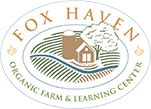ECOLOGICAL LITERACY
WHOLE SYSTEMS
Ecological literacy is our ability to understand the natural systems that make life on earth possible.
Physicist Fritjof Capra has said, “In the coming decades, the survival of humanity will depend on our ecological literacy – our ability to understand the basic principles of ecology and to live accordingly.” In the 1990’s he foresaw that ecological literacy would become a critical skill for politicians, business leaders, professionals in all spheres, and an important part of education at all levels. Ecological literacy and a living systems framework include these key elements: living systems; design inspired by nature; systems thinking; ecological paradigm and the transition to sustainability; collaboration and community building. We continue this work at Fox Haven.
WELLBEING OF PEOPLE & PLANET
Fox Haven sits at the creative intersection between people and the natural world, of which we are a part, offering peaceful contemplation and reflection while fostering innovative practices for our common wellbeing. Understanding patterns of relationship in the natural world and learning to think systemically brings new perspectives to the challenges of our time.
Our programs incorporate and teach the core aspects of ecological literacy, connecting us to a deeper experience and understanding of nature and our place in it. Fundamental is the relationship of our personal wellbeing to the health of natural systems. You are invited to further your ecological literacy at Fox Haven, here is a sampling of some entry points.

FIELD TRIPS FOR CHILDREN
Educators and parents will find our wide range of experiential programs tie to the curriculum at every grade level while providing a fulfilling learning experience outdoors and engaged in nature. Learn more about our programs for children.

VOICES OF THE LAND
Our founder commissioned this amazing report to provide an ecological way of encountering Fox Haven, based on living systems theory. Like changing the glasses we wear, we can change the way we see the world; living systems theory gives us another lens with which to understand life processes. Our society is in the transition from a mechanistic, reductionist view of the world to an ecological worldview, and this report provides a guide for this transition. As the report speaks about the land, within its historic and geologic context, it trains us in another way of thinking to enable us to engage in the life of the land, as a partner in the dance of life.

CONSERVATION RESTORATION
Our intention is to do no harm as we discover how to balance the needs of the land, its water, soil, plant and animal life, and its human community. We work with the natural flows of energy, wind, water, sun, slopes, regenerating the life force of the land, using nature to heal nature. The farm fields, tree plantings, rain gardens, composting toilets, solar pumps, drip irrigation in the organic garden, mixed forests and creeks are laboratories for learning the complex lessons of nature and exploring how to apply these learnings to our work and lives. We invite you to explore with us, as we learn and apply conservation practices to restore balance and health to the living ecosystems on Fox Haven’s campus, in ways that can be replicated elsewhere.

COMMUNITY RESILIENCE
Helping our communities become more sustainable, resilient, and able to withstand adverse conditions is a core value at Fox Haven. We partner with communities, organizations, thought leaders, and businesses to collaborate on problems, system gaps, and opportunities to create new solutions to meet those challenges. Among the many projects we’ve been part of includes co-founding the Frederick County Food Council to increase farm to institution sales of locally grown food. Currently, we’re working with local advocates to establish a food hub, so area farms and customers have easier access to fresh, local food and reduce food waste. Creating a resilient local food economy is central to the work of the Food Council. Check out our Partners page for more about community projects and how to get involved.
“Without the soaring birds, the great forests, the sounds and coloration of the insects, the free-flowing streams, the flowering fields, the sight of the clouds by day and the stars at night, we become impoverished in all that makes us human.”
– Father Thomas Berry
We are inclusive and welcome dialogue and ideas for projects that build community resilience.
Contact us to learn more about ecological literacy and programs that spark your imagination.





